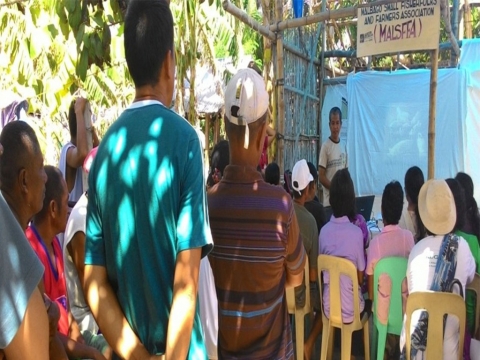Known as ‘Nong Frank’ in his locality, this 48-year-old man is indeed a oneof-a-kind farmer. He went from being a typical and conventional one to a
Gawad Saka awardee and Magsasaka Siyentista.
Francisco Manigo, a native of Matabao inTubigon, Bohol, has really something to say in terms of farming especially as he has received several training programs from the Agricultural Training Institute Regional Training Center (RTC) in Region VII. With his experiences and educational background on agriculture, Nong Frank became an organic farmer and entrepreneur. He served several times as a resource person on various training activities conducted by both government and non-government organizations pertaining to organic agriculture.
In the past, Nong Frank supported inorganic practices since he worked at a commercial fertilizer manufacturing company, convincing farmers to patronize their products. He saw that adapting to the organic way was good but it takes time to achieve the desired results. Disregarding the long term advantages of organic farming, he continued to use chemical-based farming practices.
Starting from what he learned
“Tungod sa training sa ATI, nabuka ang akong mga mata,” he admitted when he was asked how he became an organic farmer. [The ATI’s training activities opened my eyes on the situation of today’s farming.]
Nong Frank started using the natural farming system (NFS) in his vegetable garden and rice field. Instead of gradual application of organic inputs and NFS, he even decided to do it rapidly. As a result, he yielded less but it didn’t stop him from pursuing his new advocacy.
Surviving no matter what
After some time, he rehabilitated his piggery. He practiced NFS in sanitation and nutrient and feeding management. He was fine with it until he realized that he was losing time to manage his other farm commodities aside from the pigs. He said that it was due to the high labor requirement in preparing the ingredients like chopping green leaves, plants and/or fruits for fermentation. So he decided to cut the labor and looked for plants rich in nutrients but don’t need much manpower.
He remembered his thesis while in Southwestern University where he studied the utilization of Azolla, a floating fern (small green plant in form) that could be used as feeds to livestock. Applying his own research to his farm was an innovative idea and requires less work.
“Di na man kinahanglan i-chop kay gagmay man unya mas dali sad ang fermentation, 12 to 24 hours lang, ready na siya,” he further explained. [There’s no need to chop azolla and fermentation is faster. It only takes 12 to 24 hours.)
Unexpectedly, he had an accident in 2012 and, the next year, an earthquake knocked down his pig pens which forced him to sell everything. These left him with nothing.
Fortunately, he was awarded last year with a financial assistance from the ATI under a program for rural-based organizations worth P25,000. With all his knowledge and determination to rise again, he maximized the assistance in re-establishing his piggery.
“Ang ako sad mga honorarium as resource person, ako sad gigamit sa babyan,” he added. [I also used the honorarium I received as a resource person in trainings to put up my piggery].
Reaping what he sowed Presently, he operates his piggery with his so-called SNAPPY principles and technology. SNAPPY stands for Sustainable, Natural And Profitable PiggerY. He also established linkages with the market.
Nong Frank said that he also asked the local government unit in Tubigon for assistance to make his farm into a learning site as what he has dreamt of. He wants to share what he knows and influence more people to go organic.
Asked what his advice for fellow farmers is, he stressed that it’s the values. It is not easy to go organic but if you have the values of determination and put this into action, it is not impossible
Story by: Reynadez M. Lim

